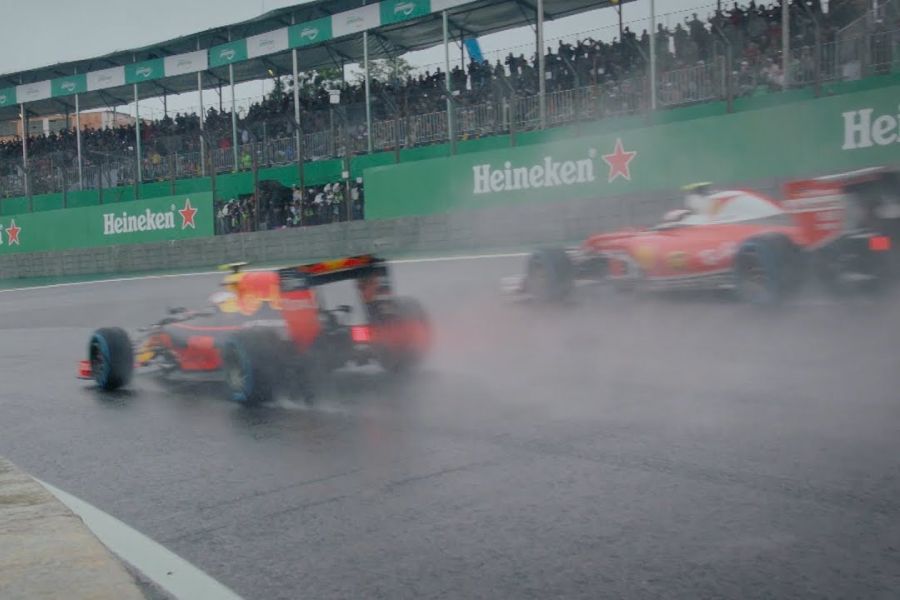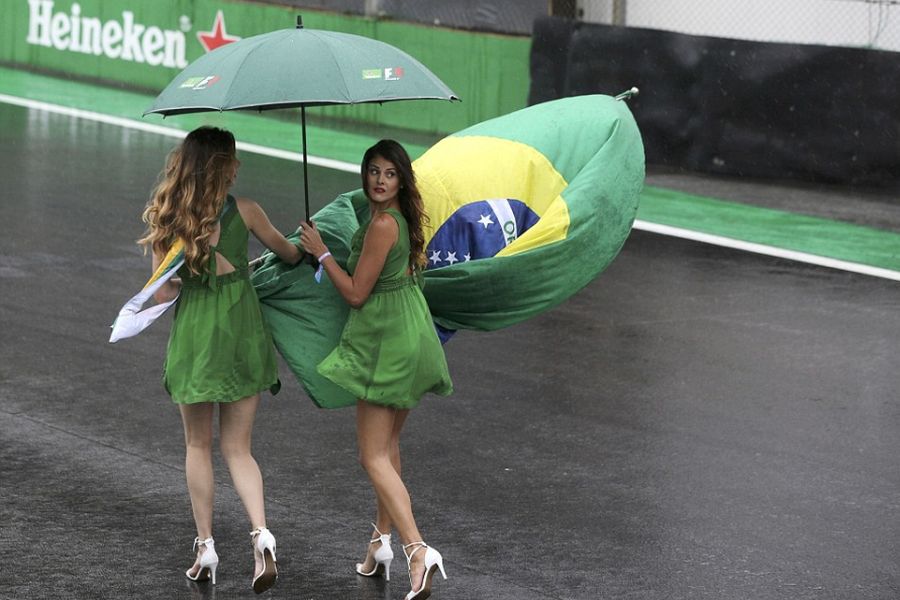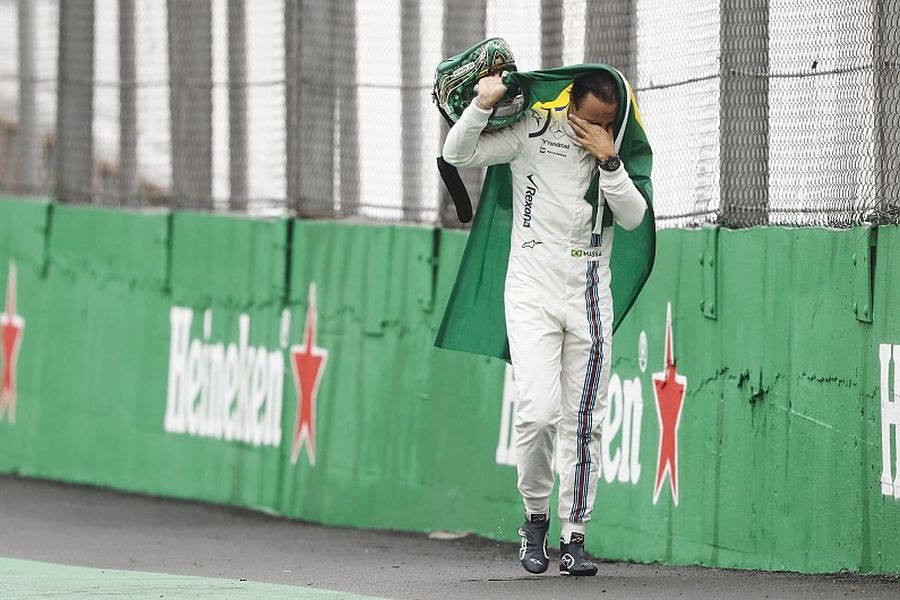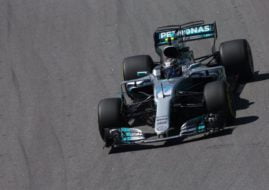The Brazilian Grand Prix offered so much drama in its history
The Brazilian Grand Prix or Grande Premio do Brasil is a Formula 1 race which was organized for the first time in 1972 and it became an integral part of the F1 World Championship in 1973. The current venue of the race and mostly through the history was the Autodromo Jose Carlos Pace at Interlagos but the race also took place at Jacarepagua ten times between 1978 and 1989.
The absolute record holder with six wins in Brazil is Alain Prost, followed by Carlos Reutemann and Michael Schumacher with four wins. Among active drivers, Sebastian Vettel is the best with three victories.

The inaugural Brazilian Grand Prix in 1972 was the non-championship event
Autodromo de Interlagos hosted the first Brazilian Grand Prix in 1972
The origins of Grand Prix racing in Brazil is coming from the 1930s. In 1936, the construction of the first permanent circuit began and in 1940 the Autodromo de Interlagos was opened near Sao Paulo. Over the next three decades, the original 7.940 km circuit was hosting various racing events, the most notable was the Mil Milhas Brasileiras.
In the early 1970s, the schedule of races at Interlagos was full of different events but something was missing to put the greatest Brazilian race track on the international map. And then, in March 1972, the first ever Brazilian Grand Prix was organized.
Carlos Reutemann was the first winner of the Brazilian Grand Prix
In 1972, the F1 World Championship calendar consisted of twelve Grand Prix races. Brazil wanted to enter the championship as a host but FIA required a demonstration race as some kind of a quality test. Because of that, the first ever Brazilian Grand Prix was a non-championship race.
The race was held on March 30, between the second and third round of the championship. Eleven drivers were on the grid. The Brazilian Emerson Fittipaldi delighted a home crowd by taking the pole position in a Lotus 72D. He was also the fastest driver in the race but Carlos Reutemann (Brabham) took the victory after Fittipaldi’s retirement on lap 33 (of 37). Ronnie Peterson (March) and Wilson Fittipaldi (Brabham) completed a podium.
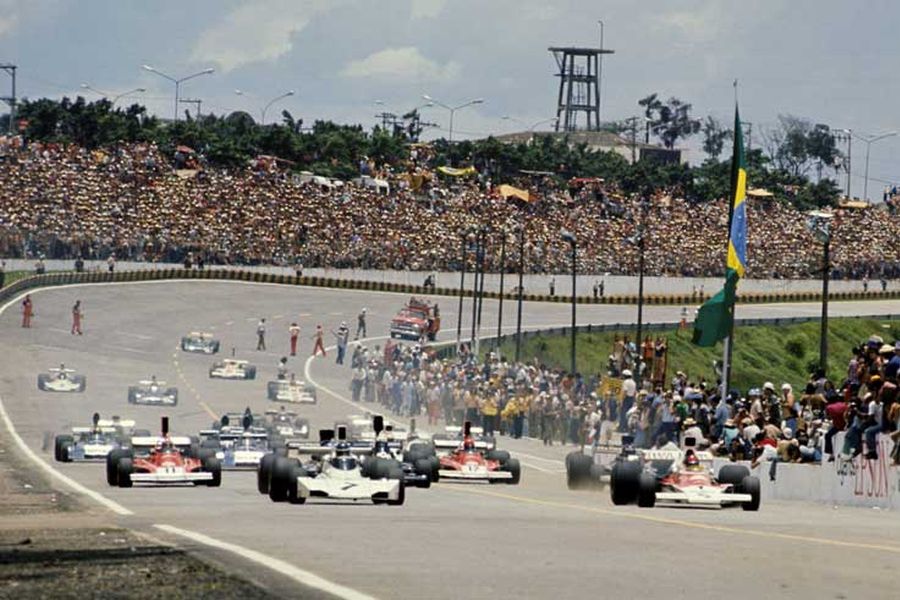
A picture from the 1974 Brazilian Grand Prix
Three consecutive wins for Sao Paulo-born drivers
In 1973, the Brazilian Grand Prix was held in February as the second race on the 15-race F1 calendar. The defending champion and Sao Paulo native Emerson Fittipaldi won the race in a Lotus ahead of Jackie Stewart (Tyrrell) and Denny Hulme (McLaren). Next year, Fittipaldi repeated a victory as McLaren driver. He shared a podium with Clay Regazzoni (Ferrari) and Jacky Ickx (Lotus).
In 1975, the race winner was another Brazilian hero Jose Carlos Pace, also born in Sao Paulo. He won a race driving for Brabham and defeating two McLaren drivers Emerson Fittipaldi and Jochen Mass. It remained career’s only F1 Championship Grand Prix win for Pace.
In 1976, the race was the opening round of the championship and defending world champion Niki Lauda (Ferrari) took the victory. He won ahead of Patrick Depailler (Tyrrell) and Tom Pryce (Shadow). It was the first race in five years without a Brazilian driver on a podium. The best Brazilian was Jose Carlos Pace in the tenth place.
In 1977, the race was the second round of the championship and Argentine driver Carlos Reutemann (Ferrari) scored his second win at Interlagos. James Hunt (McLaren) and Niki Lauda (Ferrari) joined him on a podium.

Carlos Reutemann at finish line of the 1978 Brazilian Grand Prix
Moving a race to Jacarepagua in 1978
The complaints about the very rough surface at Interlagos resulted with a move of the Brazilian Grand Prix to Jacarepagua circuit near Rio de Janeiro in 1978. Carlos Reutemann (Ferrari) clinched his third win. Emerson Fittipaldi reached a podium driving for his own team and Niki Lauda (Brabham) was third.
The upgraded and modernized Interlagos hosted the race again in 1979 and 1980. The winners were two Frenchmen – Jacques Laffite (Ligier) in 1979 and Rene Arnoux (Renault) in 1980.
Alain Prost’s five wins at Jacarepagua
Interlagos wasn’t improved enough and it dropped out from F1 calendar for almost a decade. From 1981 to 1989, the nine editions of the Brazilian Grand Prix took place at Jacarepagua. Carlos Reutemann scored his fourth win in 1981 but the ‘King of Rio’ in that period was Alain Prost who recorded five victories. In 1982, he won in a Renault and then four more times in a McLaren (1984, 1985, 1987, 1988).
The other race winners at Jacarepagua were Nelson Piquet and Nigel Mansell. Piquet won in a Brabham in 1983 and then in a Williams in 1986. Nigel Mansell closed the Jacarepagua era with a victory in a Ferrari in 1989.
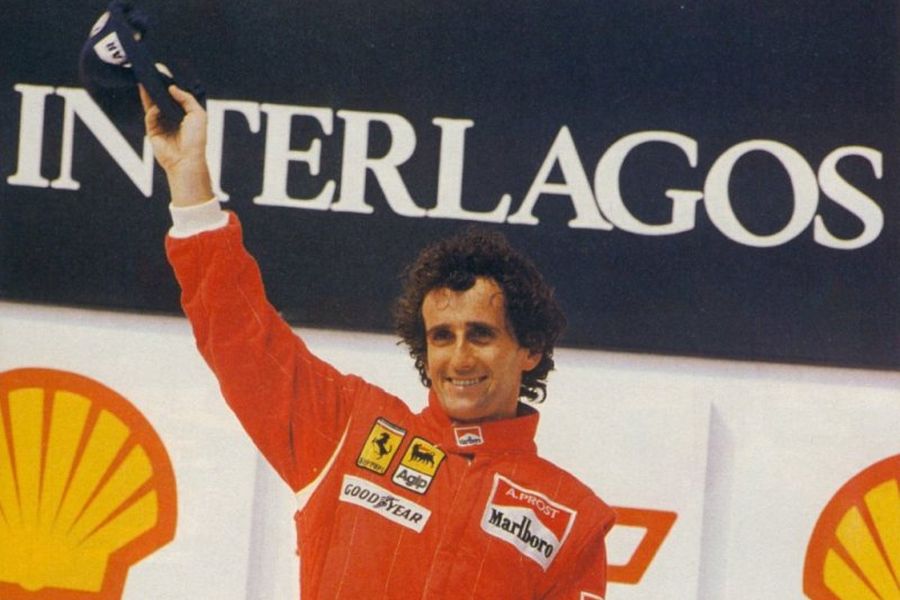
Alain Prost has won five times at Jacarepagua and once at Interlagos
Sixth win for Prost at new Interlagos
In 1990, the Brazilian Grand Prix returned to Interlagos. In the meantime, the circuit has been renamed to Autodromo Jose Carlos Pace to honor F1 driver from Sao Paulo who died in a plane crash in 1977.
The first winner on the new 4.325 km long circuit was Alain Prost in a Ferrari. It was his 40th Grand Prix win in a career, what was the record in that time, and also the record-breaking sixth win in Brazil.
Two wins for Ayrton Senna in 1991 and 1993
In 1990, Prost shared a podium with McLaren drivers Gerhard Berger and Ayrton Senna. The new Brazilian hero Ayrton Senna clinched his first win in his home Grand Prix a year later, in March 1991. He shared a podium with Riccardo Patrese (Williams) and McLaren teammate Gerhard Berger.
Senna’s second victory came two years later. This time, he was sharing a podium with Damon Hill (Williams) and Michael Schumacher (Benetton). Between two wins of Ayrton Senna, Nigel Mansell triumphed at Interlagos in 1992. He was on a podium together with teammate Riccardo Patrese and Michael Schumacher (Benetton).
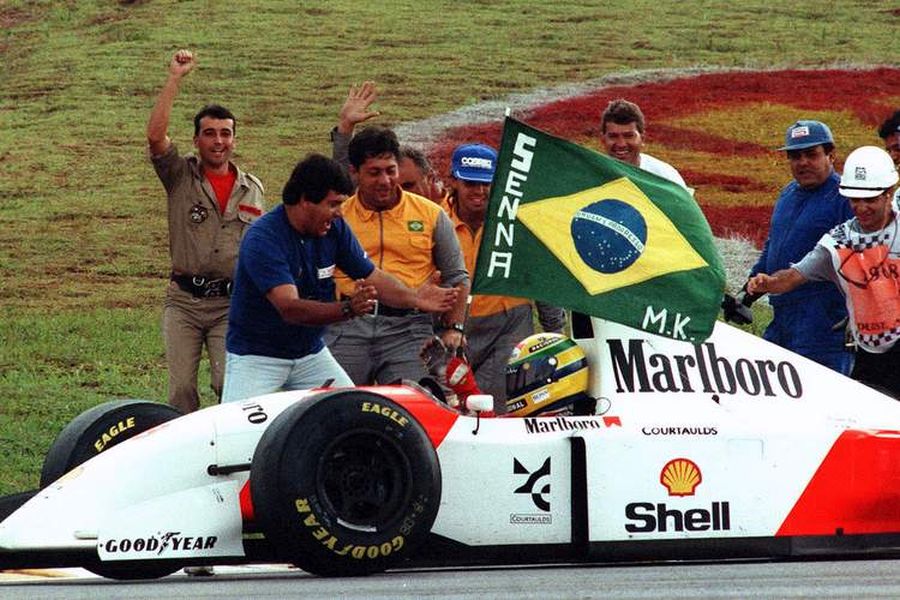
Ayrton Senna celebrated wins at Interlagos in 1991 and 1993
Michael Schumacher’s first win in 1994
After two consecutive third-place finishes at Interlagos in 1992 and 1993, Michael Schumacher finally reached the top podium spot in 1994, still driving for Benetton. Damon Hill (Williams) and Jean Alesi (Ferrari) completed a podium.
The season 1995 was the first year without Ayrton Senna, who lost a life in May 1994. Michael Schumacher scored his second win at Interlagos, again driving for Benetton. It was a controversial race because Schumacher’s car initially had been excluded for apparently using illegal fuel during the race, but then reinstated.
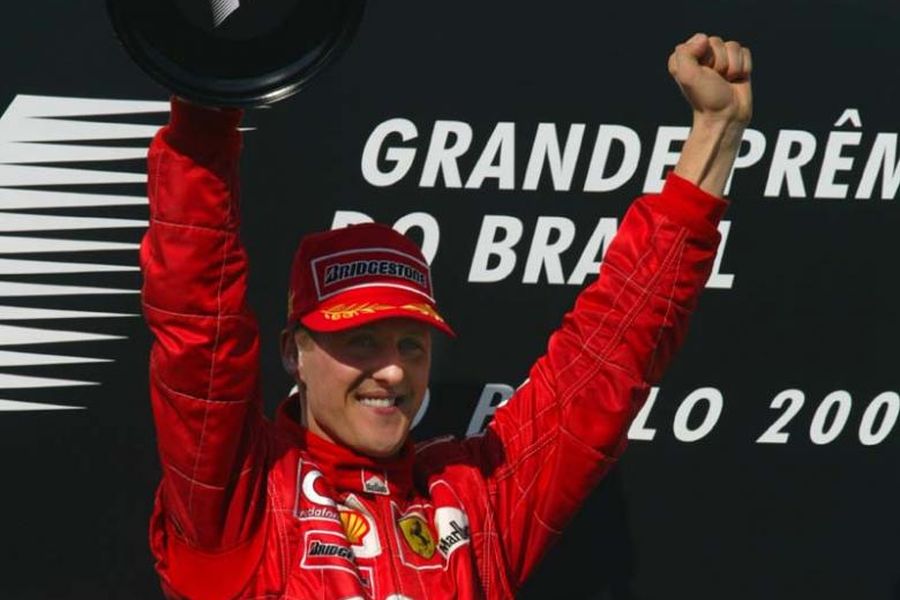
Michael Schumacher at 2002 Brazilian Grand Prix
Schumacher reached fourth win in 2002
After several podiums earlier, Damon Hill finally won a race at Interlagos in 1996, driving for Williams-Renault. It was the first of his eight wins in the season which ended with Hill’s championship title. Williams-Renault took one more victory in 1997, the race winner was Jacques Villeneuve.
Mika Häkkinen improved a score for McLaren with two wins in 1998 and 1999, and then Michael Schumacher added two more wins to his and Ferrari’s account in 2001 and 2002. Between those two wins, David Coulthard won a race in a McLaren in 2001.
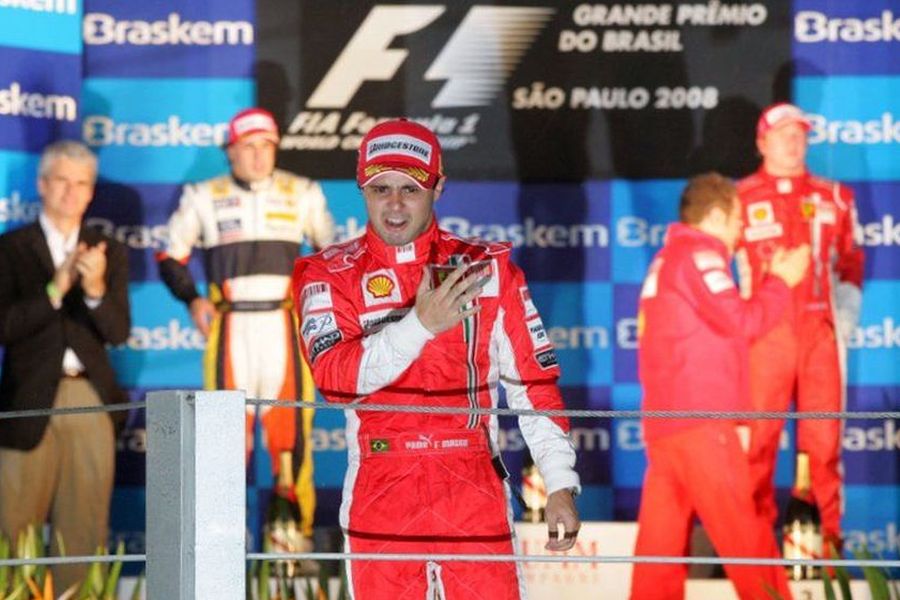
Felipe Massa at 2008 Brazilian Grand Prix
Felipe Massa was the last Brazilian winner at Interlagos
In the following years, Giancarlo Fisichella (Jordan) won a controversial red-flagged race in 2003, then Juan Pablo Montoya triumphed two times (2004, 2005) with two different teams (Williams, McLaren) and Kimi Raikkonen won a race in 2007 in a Ferrari.
But, the most notable wins in that period were two wins of Felipe Massa in 2006 and 2008, both as Ferrari driver. In 2006, he became the fifth Brazilian driver to win the Brazilian Grand Prix while his victory in 2008 was the last Brazilian triumph at Interlagos.
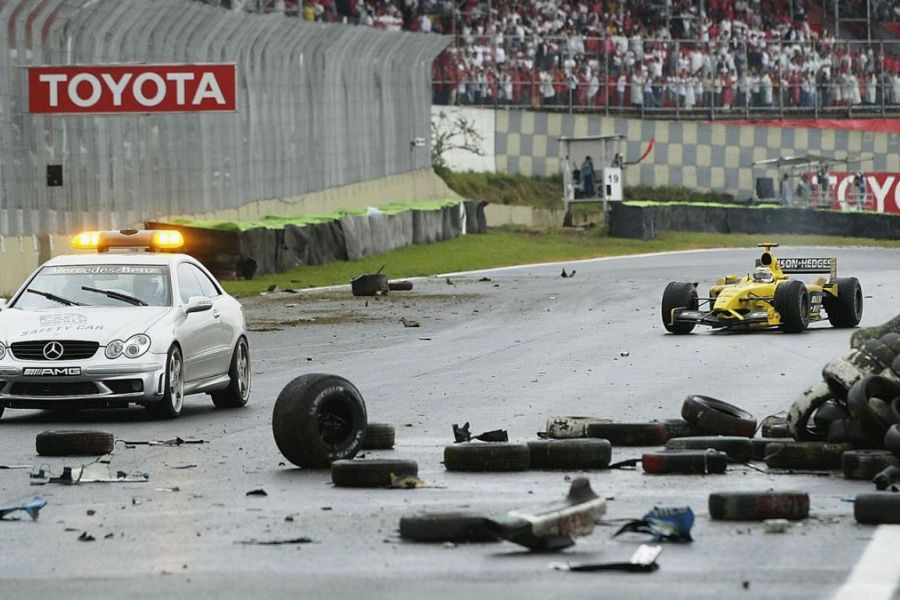
A scene after Fernando Alonso’s crash at 2003 Brazilian Grand Prix
Moving a race to autumn date in 2004
The milestone change happened in 2004 when the race was moved to the autumn date, becoming the season’s finale of the Formula 1 World Championship. The first such a race, which took place on October 24, was not decisive in the championship because Michael Schumacher already secured a title.
In 2005, the race was 17th round (of 19) and Fernando Alonso secured the title with two races remaining, becoming the youngest ever F1 champion after he finished third at Interlagos.
Brazilian Grand Prix as season’s finale from 2006 to 2008
The Brazilian Grand Prix was the last round of the championship again in 2006. Fernando Alonso came to Brazil as the championship leader and he needed just one point to take his second title. He succeeded by finishing second, behind Felipe Massa.
In 2007, we saw a dramatic finale in which Lewis Hamilton came to Brazil as a leader but lost a title by just a point to race winner Kimi Räikkönen. In 2008, one more dramatic race at Interlagos decided a champion. Felipe Massa won a race, what was his 11th and the last win in a career, but Lewis Hamilton’s fifth place gave him his first championship title with a just one-point advantage over Massa.

Autodromo Jose Carlos Pace at Interlagos
Switching places with Abu Dhabi for season’s finale
In 2009, Abu Dhabi Grand Prix became the season’s finale but the championship battle was decided in the penultimate round at Interlagos. Mark Webber (Red Bull) won the race while Jenson Button (Brawn) secured a title. Red Bull-Renault scored three more wins at Interlagos, with one more win of Mark Webber (2011) and two wins of Sebastian Vettel (2010, 2013).
In 2011, Abu Dhabi and Brazil switched places and Interlagos was a host of season’s finale from 2011 to 2013. Another switch on a calendar followed in 2014 when Abu Dhabi took over the season’s finale, retaining that position until today.
The race winners in that period were Jenson Button (McLaren, 2012), Nico Rosberg (Mercedes, 2014 and 2015), Lewis Hamilton (Mercedes, 2016 and 2018) and Sebastian Vettel (Ferrari, 2017).
In the meantime, the contract for the Brazilian Grand Prix at Interlagos had been extended until 2022.
Photos: Formula 1, GP Brasil, Sutton Images,


